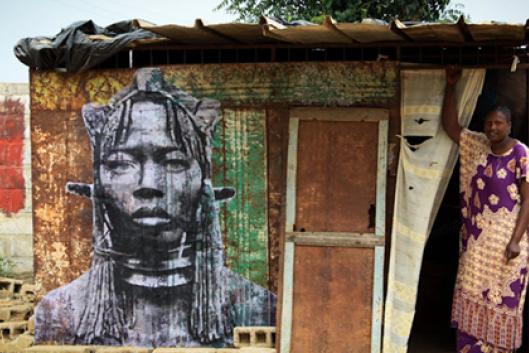In recent decades, the sustainable management of natural resources and the conservation of biological diversity have become a major concern at all levels. On the African continent, threats to forests are rapidly increasing with the penetration and expansion of multinational corporations that benefit from the complicity of governments. But facing these threats are the determination and commitment of grassroots communities, and especially women. Like the Amazon warrior women of King Béhanzin (in the 19th century), more and more of them are rising up, creating a powerful barrier against the destruction of ecosystems, and particularly forests.
In numerous African communities, in countries like Benin, Ethiopia, Kenya and South Africa and other parts of the continent, large numbers of women are organizing and speaking out to be the voice of the voiceless. They are developing alternatives as a means of putting up fierce resistance against those terrorizing the forests.
Although women were long treated as vulnerable beneficiaries by all sorts of ‘development’ projects, their leadership in protecting what they consider to be the source of life has now been amply demonstrated. Large popular movements are established and defended by these African Amazons. Many women, through organizations like Eco Ecolo or Mother Jah, travel through hills and valleys, like missionaries, raising awareness. They help local communities to stand on guard against the destructive impacts of the enemies of the forests and of the environment as a whole.
To an ever greater extent, these Amazons advocate the return to endogenous values and traditions to ensure the protection and sustainability of the sacred forests, which serve as a refuge for many different animal and plant species, as well as the religious practices and cultural identities of peoples and communities. For the communities, the divinities found in the forest play the role of protectors of communities and territories. Purification, initiation, induction and other ceremonies are often held in the forest.
To ensure the sustainable management of these forests, the Amazons have undertaken a series of measures in which culture and beliefs are at the heart of their means of struggle and resistance. They promote the practice of vodun (“voodoo”) and other rituals in locations within the forests, which helps to protect these areas and curb the voracious advance of the destroyers of the forests. Women, whether priestesses or followers, fervently perpetuate the rites and traditions that help maintain the centuries-old forests that they have inherited. For some spiritual cults, like Oro in Benin, the forest serves as the foundation and means of expression. As a result, the followers of this very popular cult are mobilizing to halt the violations that threaten the survival of the forests. Other endogenous cults or secret societies such as zangbéto, kouvvito, hêviosso and others are promoted and valued by women, who are increasingly playing a leading role. For many African women and their communities, the sacred forests ensure health, happiness, prosperity, procreation, fertility and rain. Today large numbers of women are returning to tradition in order to stop the advance of the predators of the forest.
These Amazon women now frequently appear on local radio and television stations to defend the forests. They advocate the use of alternative energy sources, and strive to serve as models themselves. They organize civil society to fight for the defence of the environment, and in doing so, they put forward alternative reports to those produced by governments.
In numerous villages and towns, they initiate and train women in the strategy of savings for change. Mechanisms such as “bio-rights” – a micro-credit system - are highly sought after by these women for transforming communities and spreading their message. The African Amazons carry out lobbying and advocacy to ensure respect for the law for the benefit of local communities. They strengthen the capacities of local communities to defend their endogenous knowledge and sacred rituals and resources, at the same time strengthening their own capacities through the sharing of experiences. To as great an extent as possible, they support communities in claiming legal recognition of their rights and valuing the history of their origins and traditional knowledge, which reinforces the communities’ attachment to their heritage. They promote the transfer of endogenous knowledge from generation to generation, to perpetuate traditions and preserve the legacy of their ancestors.
It is clear than in many African communities, the role of women in sacred rituals is very important. As a result, the sacred forests have been preserved until today, unlike ordinary forests, which have suffered the wrath of human activity.
Fiacre NOUWADJRO e Apollinaire OUSSOU LIO,
African Biodiversity Network (ABN)
